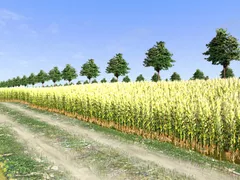Introduction
The corporate climate discussion and the explicit goal to promote renewable energies offer the opportunity to establish new agricultural production systems which are more sustainable from the perspective of nature conservation than the current agricultural systems. At the same time these new land use systems should be of economic interest to farmers to enhance their chances of establishment.
Agroforestry, a land use system which links agricultural use to forestry can contribute to this target. Depending on the design of such systems, positive impacts could be erosion control and windbreak, fostering biodiversity conservation, enrichment of monotone agricultural landscapes with trees, improvement of habitat connectivity and climate change mitigation by carbondioxid sequestration in soil and biomass.
Goal
The project team focuses especially on integrated solutions, combining production-related, economic and nature conservation aspects.
Central objectives of the project are
-
Identification of criteria for sustainable agroforestry systems in Germany from a nature conservation perspective and
-
Deduction of recommendations concerning the adaptation and improvement of legal and financial instruments to promote the establishment of ecologically sustainable agroforestry systems in Germany.
Examples of research questions are
-
Which significance could agroforestry systems in Germany have for protecting biodiversity, mitigating climate change and conserving or improving visual landscape?
- To what degree could agroforestry systems help to combine land use and nature conservation?
The final output of the project will be a guideline for practitioners providing information about agroforestry systems in Germany. The guideline is addressed to practitioners of agriculture (consultants) and nature conservation as well as relevant stakeholders and key communicators from politics, business and society.

Project management:
Technische Universität München
Chair for Strategic Landscape Planning and Managment
Dr. Wolfgang Zehlius-Eckert
Co-operation:
Technische Universität München
Institute of Agricultural Economics and Farm Management
Prof. Dr. Hoffmann
Bavarian State Institute of Forestry
Dipl.-Forst. Thomas Huber